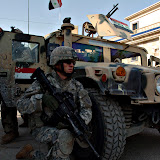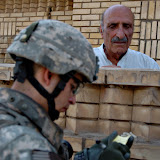Strife and Ice, Staples of Life, Overlap in Iraq
NY Times
July 28, 2007
BAGHDAD, July 27 — Each day before the midsummer sun rises high enough to bake blood on concrete, Baghdad’s underclass lines up outside Dickensian ice factories.
With electricity reaching most homes for just a couple of hours each day, the poor hand over soiled brown dinars for what has become a symbol of Iraq’s steady descent into a more primitive era and its broken covenant with leaders, domestic and foreign.
In a capital that was once the seat of the Islamic Caliphate and a center of Arab worldliness, ice is now a currency of last resort for the poor, subject to sectarian horrors and gangland rules.
In Shiite-majority Topchi, ice makers say that Moktada al-Sadr’s Mahdi Army issued a diktat on the first day of summer ordering vendors to set a price ceiling of 4,000 dinars ($3) per 55-pound block of ice, 30 percent less than they charge in areas outside Mahdi Army control.
Everyone complied, delivering an instant subsidy to the veiled women and poor laborers who are the radical Shiite cleric’s natural constituency. The same price is enforced in his other power bases, like Sadr City.
Some suppliers are horrified. “They are trying to improve their image, and gain favor,” a merchant grumbled, as a sickle-wielding colleague chopped the hollow crystalline blocks in half for black-robed women to cram into shopping bags. “But it won’t do much good, we all know what the Mahdi Army are.”
Wearied by four years of chaos, others support the move to reimpose order, any order.
“There is nothing better than law and order,” said Omar Suleiman, another factory manager. “In the days of Saddam Hussein, the government used to control the price of ice. Now there is no control, except where the militias are doing it.”
Shiites are not alone in manipulating supply to suit their own sectarian agendas.
At one plant, situated under a highway overpass in Topchi, all four delivery drivers quit last year after warnings that sectarian gangs would kill them if they continued to drive across the invisible but all-too-real lines dividing Baghdad’s Sunni and Shiite neighborhoods.
Customers in one suburb cautioned them that takfiris — fanatical Sunni extremists — had decreed their frozen product un-Islamic.
“In Ghazaliya, it is forbidden to sell ice because the takfiris said, ‘The Prophet Muhammad had no ice in his time,’ ” said Khatan Kareem, a manager at the factory where the drivers worked, shaking his head at the absurdity.
Many of Baghdad’s ice plants are museum pieces. In one, the industrial compressor was manufactured in India in 1960. Another’s was built by L. Sterne & Co. in Glasgow more than half a century ago.
Hussam Muhammad, whose family owns the equipment in the business where Mr. Kareem works, never imagined that the dilapidated factory, built in 1952 when Iraq was still a monarchy, would survive into the post-Saddam Hussein era.
“In 2003, I thought the ice business would be finished because everyone would have electricity and refrigerators once the Americans arrived,” Mr. Muhammad said as he scuttled from fan belt to ice-blistered piping trying to keep the plant limping along. “The fish sellers and meat stores who used to buy from us are gone, closed because of the security situation. Now it is the poor people who come because they don’t have money to pay for generators to keep their food and drinks cold.”
Baghdad’s sectarian compartmentalization of ice is as rigid for customers as for deliverymen.
Such is the fear of the gunmen that at the factory under the overpass, only the immediate neighbors can safely reach its grimy doors.
“People used to come here from Sunni areas, Taji, Amiriya and Jamiya to buy ice because they had no ice factories in their areas,” Mr. Kareem said. “But the Sunnis cannot reach this area now, and I am the same. I am Shia, and I cannot go to Yarmouk.”
The thought is particularly rankling to Mr. Kareem because until three months ago he lived in Yarmouk, a Sunni neighborhood, and enjoyed a secure government job, until an Iraqi Army raid uncovered a Shiite icon on his wall.
“They beat me up, burnt my house and forced me out of the area,” he said, squatting amid the nauseating smell of ammonium that permeates all ice factories. “I now live in my relatives’ kitchen. And I work here.”
His depression reflects the frustration of the Iraqi middle class, which prided itself on being one of the most educated in the Arab world, but now sees itself falling further behind its regional rivals and back onto the technology of its grandfathers.
In wealthier districts consumer goods are stacked high on shelves, for the “haves” who can afford to buy black-market electricity from private generator owners.
But millions of “have-nots” cannot afford this luxury, and many of those generator owners have now been killed or driven away by militias intent on securing their lucrative assets.
Ice, ostensibly the least political of commodities, requires only water, electricity and a few chemicals.
But in Baghdad’s current state of polarized violence, no business is an island. Raw materials must pass the checkpoints and gunmen, with their arbitrary rules and instant punishments, as must customers, suppliers, staff and the finished product.
The ice factories — cash cows in the peak summer season — have not escaped the gunmen’s notice.
In the Sunni enclave of Adhamiya, newly walled off from its Shiite neighbors to halt cross-community slaughter, Taha Khaleel complained that his drivers and mechanics were at the mercy of the Shiite-dominated Iraqi Army checkpoint that controls the gate.
“It depends on their mood,” he said. “This causes problems for us in the continuity of fuel supplies. The drivers are more reluctant to come to us now because of that, and because of the insults they face.”
A kidnapped factory owner in Taji was released only after he surrendered his car. At the Qutub Ice Factory in Baghdad, the owner has already fled Iraq after receiving a death threat, and employees say most of its middle-class customers have also gone.
Not so fortunate are the poor buyers in a street market the Salaam neighborhood, where wooden ice shacks have sprung up in recent months, despite the adjacent sewage and piles of rotting garbage.
Alarmed by tales of disease, many buyers now drop sterilization pills into the frozen blocks. If they are lucky, the stores will have ice from Sulaimaniya or Erbil, Kurdish cities where it is made from clean mountain water. If unlucky, the impure Baghdad product, with its distinctive yellow sheen.
“I never used to buy ice in Saddam’s regime, because I could use my refrigerator. But nowadays I have to because there is no electricity, and we need cold water,” said Muhammad Abbadi, 52, the owner of a clothing store. “Ice is the only source, even if it is dirty. Both my girls fell sick with typhoid two weeks ago.”
Reporting was contributed by Khalid W. Hassan, Ahmad Fadam, Wisam A. Habeeb, Karim Hilmi and Mudhafer Al-Husaini. Mr. Hassan was killed July 13.



